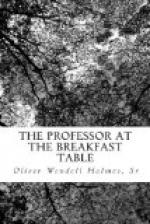[This physician believes we “are even now in a state of semi-barbarism”: invasive procedures for the prolongation of death rather than prolongation of life; “faith",as slimly based as medieval faith in minute differences between control and treated groups; statistical manipulation to prove a prejudice. Medicine has a good deal to answer for! D.W.]
Perhaps some think we ought not to talk at table about such things.—I am not so sure of that. Religion and government appear to me the two subjects which of all others should belong to the common talk of people who enjoy the blessings of freedom. Think, one moment. The earth is a great factory-wheel, which, at every revolution on its axis, receives fifty thousand raw souls and turns off nearly the same number worked up more or less completely. There must be somewhere a population of two hundred thousand million, perhaps ten or a hundred times as many, earth-born intelligences. Life, as we call it, is nothing but the edge of the boundless ocean of existence where it comes on soundings. In this view, I do not see anything so fit to talk about, or half so interesting, as that which relates to the innumerable majority of our fellow-creatures, the dead-living, who are hundreds of thousands to one of the live-living, and with whom we all potentially belong, though we have got tangled for the present in some parcels of fibrine, albumen, and phosphates, that keep us on the minority side of the house. In point of fact, it is one of the many results of Spiritualism to make the permanent destiny of the race a matter of common reflection and discourse, and a vehicle for the prevailing disbelief of the Middle-Age doctrines on the subject. I cannot help thinking, when I remember how many conversations my friend and myself have sported, that it would be very extraordinary, if there were no mention of that class of subjects which involves all that we have and all that we hope, not merely for ourselves, but for the dear people whom we love best,—noble men, pure and lovely women, ingenuous children, about the destiny of nine tenths of whom you know the opinions that would have been taught by those old man-roasting, woman-strangling dogmatists.—However, I fought this matter with one of our boarders the other day, and I am going to report the conversation.
The divinity-student came down, one morning, looking rather more serious than usual. He said little at breakfast-time, but lingered after the others, so that I, who am apt to be long at the table, found myself alone with him.
When the rest were all gone, he turned his chair round towards mine, and began.
I am afraid,—he said,—you express yourself a little too freely on a most important class of subjects. Is there not danger in introducing discussions or allusions relating to matters of religion into common discourse?
Danger to what?—I asked.
Danger to truth,—he replied, after a slight pause.




